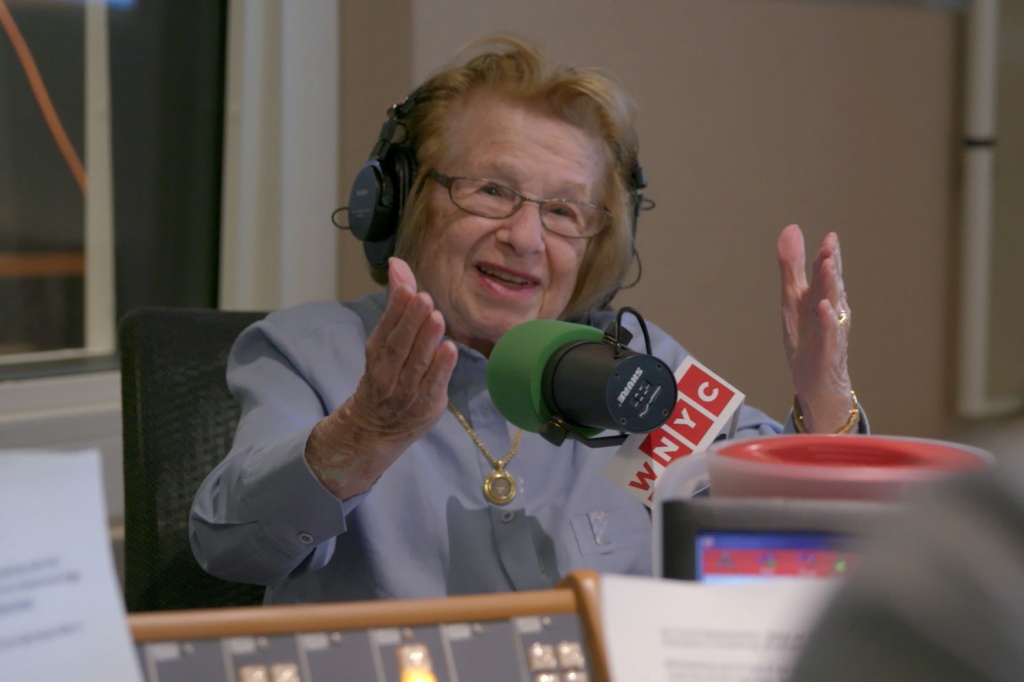Dr. Ruth Westheimer is a dynamo — a nonagenarian who has no intention of retiring.
An out gay filmmaker, Ryan White does his best to keep up with the diminutive (4’7”) sex therapist — known for her candor and common sense — in his loving portrait “Ask Dr. Ruth.”
Westheimer made a name for herself in the 1980s as host of the popular WYNY radio show “Sexually Speaking.” Launched into fame and fortune, she became a pop-culture icon and sought-after media personality.
White’s film premiering May 3 at Landmark Ritz Five, unfolds in a rather conventional manner. He observes Dr. Ruth in her Washington Heights, Manhattan, apartment, records her conversations with colleagues, friends and family members and tags along to her personal appearances.
Along with her professional history, “Ask Dr. Ruth” chronicles Westheimer’s personal journey, largely by use of animated sequences that depict her as a young girl in Germany, where she was born Karola Ruth Siegel.
When Westheimer was 10, the Nazis captured her parents and she was sent to Switzerland as part of the Kindertransport. She arrived at an orphanage, where she cared for other children and eventually met her first boyfriend.
Her painful past includes poignant diary entries and correspondence with her parents. Later scenes show Dr. Ruth looking into her parents’ deaths, something she had not previously pursued.
Westheimer vacillates between openness and secrecy in the film. She talks about her three marriages, an injury she suffered when she was a sniper for the Jewish Underground Army, and how she came to study sexuality. She tells White she worked with Helen Singer Kaplan, a noted sex therapist, at Planned Parenthood, but she only scratches the surface, providing basic biographical information.
But when Dr. Ruth’s granddaughter asks her if she is a feminist, Westheimer provides a complicated and nuanced answer; this is when the documentary is at its best.
In another compelling scene, Dr. Ruth is interviewed by out WNYC radio host Jonathan Capehart, during which he applauds her for helping him understand his sexuality. Dr. Ruth makes the point that “respect is not debatable,” while the two discuss whether “normal” exists.
Dr. Ruth has worked to diffuse shame around sex. Her efforts to support abortion and LGBTQ rights stem, in large part, from her opinions regarding sex. While Westheimer emphatically refuses to discuss politics, she has always been rather progressive and, as White shows in his documentary, was talking about AIDS when it was an unpopular topic.
White shows Dr. Ruth’s sensitivity toward the gay community at the height of the epidemic. She brought awareness of HIV and AIDS to a wide audience, answering questions from those afraid and confused by the disease.
“Ask Dr. Ruth” shows little about its subject’s sex life, save a brief recollection of losing her virginity as a teenager on a haystack. But White captures Dr. Ruth’s infectious personality, zest for life and outgoing nature in his depiction of Westheimer as a single mother in New York circa 1958.
Viewers who are fans or unfamiliar with her work will certainly feel like they understand Dr. Ruth better after watching the film. It nicely incorporates stories, memories, photographs and video clips to provide an affectionate portrait of an unconventional and uncompromising woman.
The montage of Dr. Ruth’s rise to fame, occurring in the last portion of the documentary, is terrific. Clips of her talking on camera are particularly amusing — like getting censored when trying to convince Conan O’Brien to use a certain term for sexually frustrated women.
Viewers may also chuckle when her son, Joel, recounts a story of returning to his dorm room only to hear his mother’s voice emanating from multiple radios in his hallway.
“Ask Dr. Ruth” may not provide all the answers about its subject, but White’s film does raise questions about how we think and talk about sex. He has made a polite documentary that demystifies Westheimer. She is more than just a woman who, some people think, talks dirty.

